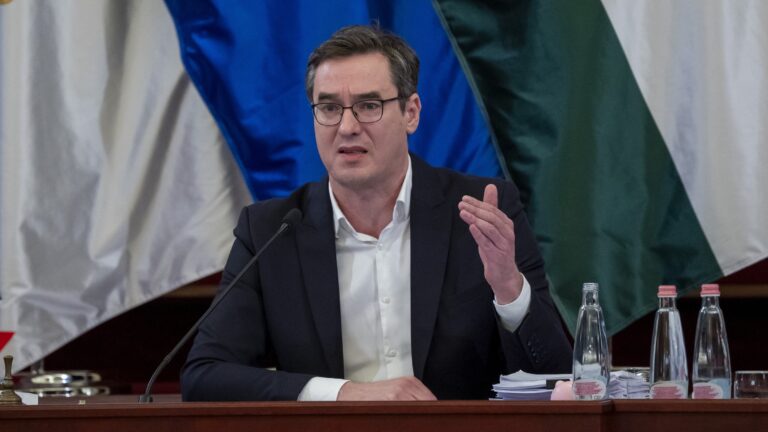The fifth annual MCC Feszt is currently going ahead full throttle in Esztergom, Hungary. On Friday, 1 August, famous free speech advocate, climate change sceptic, and professor at the University of Austin Michael Shellenberger took the main stage to deliver a short lecture on his views on environmentalism. He was then joined by MCC Visiting Fellow Leonardo Orlando and Director General for International Affairs at the Ludovika University of Public Service Liliana Smiech for a panel discussion.
Mr Shellenberger shared the curious fact that major publications and universities in the West are now publicly discussing how to address ‘climate anxiety’ among young people—that is, the fear and anxiety they feel about the perceived dangers of climate change. This is despite the fact that, according to Shellenberger, global carbon emissions have been decreasing for years. Hungary, for example, has halved its emissions in recent years, and emissions have also significantly declined in the United States. He attributes these positive developments primarily to the transition from coal to nuclear power.
Mr Shellenberger went on to list a number of data sets that show positive environmental trends. Coral coverage at the Great Barrier Reef has reached record highs (a story which, as the speaker pointed out, was originally censored by Facebook); only 1 per cent of species have gone extinct since the 1500s; the highest number of heatwaves were recorded in the 1930s; and fewer people die in natural disasters now than at any other time in history. Thus, the professor believes that generational ‘climate anxiety’ is not warranted.
He also pointed out that technological, not environmental changes are what determine food production in developing countries. The speaker then criticized solar power, highlighting that it needs 300 times more land than nuclear power. Mr Shellenberger stated that the optimal evolution of energy resources over history has been going from wood and dung as the primary source to coal, then to oil, then to natural gas, and finally, to uranium. He also claimed that the modern environmentalist movement is somewhat of a pseudo-religion.
At the following panel discussion, Ms Smiech agreed that modern environmentalism is more of a faux religion than a secular movement, where the ‘adherents’ are motivated by a fear of the end of the world. Meanwhile, Mr Orlando has shared that he does not believe that the climate change alarmist movement is being manipulated by a shadowy mastermind, rather, it is ‘a bunch of people following their own self-interest,’ as it was in the case of COVID lockdowns. He has also pointed to the ‘overproduction of the elite’ as a problem in the Western world today.

On that note, Ms Smiech has shared that when the liberal Tusk government took over in her home country of Poland, they created a number of new ministries to give positions to this new elite. By contrast, in Mr Orlando’s home country of Argentina, the right-wing populist President Javier Milei reduced the number of ministries from 20 to nine upon taking office.
The left-wing assault on energy has already had its consequences in Germany, Mr Shellenberger has pointed out, as the country’s GDP has posted negative GDP growth in the past few years since the federal government has started shutting down perfectly functioning nuclear plants.

In Poland, in the meantime, the previous Morawiecki government had already signed contracts to build the country’s first-ever nuclear power plant. However, with the change of government in 2023, that project was abandoned for political reasons, Ms Smeich told the audience. On the broader issue of climate anxiety among the younger generation, she said: ‘If a society fears, it consolidates. And if a society consolidates, it is easier to lead [the people].’
Read next:







